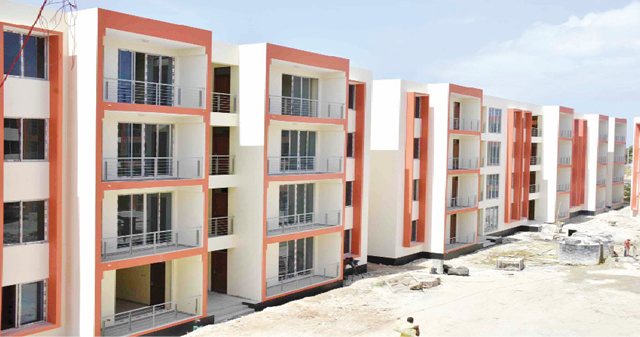
Residential property market cools on 76% power tariff hike
The increase of over 130 percent in the price of diesel in seven months to N780 per liter has led to about a 76 percent hike in power tariff across serviced residential estates in Nigerian cities.
This has added to rising costs for residential and commercial property occupiers, a new report has shown.
The report, compiled by Estate Intel, an online property research platform, highlights steps taken by operators in the residential real estate market to deal with diesel price hikes.
Different estates operate different power consumption models, but what is common to them is the tariff-based system, which bills residents or occupiers according to their levels of consumption.
Frank Okosun, the senior partner/CEO of Knight Frank Nigeria, had told BusinessDay in an interview that within the serviced estates being managed by them, they had been able to create a convenient system that made payment for energy consumed and other services less stressful.
“We have separated service charge from house rent to ease payments and to give tenants the opportunity to determine how and when they want power supplied to their apartments,” he said.
This means that those who can afford a 24-hour power supply can get it while those that want just six hours to get it, he said.
“But what we have seen mostly is that tenants now opt for reduced power supply in response to the economic realities that have seen many people struggling with rising costs,” Okosun added.
Dolapo Omidire, founder/CEO of Estate Intel, noted that there have been some changes in most estates.
He told BusinessDay that in March this year, they started documenting how residential occupiers and facility managers were responding to the high diesel price.
“With the help of Venco and Gate pass, property technology firms, we also tracked the movement in tariffs and energy policy changes in multiple residential communities within the country,” he said.
Omidire said that within the 22 estates surveyed in Yaba, Ikeja, Surulere, Victoria Island, Lekki Phase 1, Ikoyi, Osapa, Chevron, and Ajah, they discovered that the average power tariff grew by 76 percent from 90/KwH to 178/KwH between February and July.
According to him, because it was impossible to accurately estimate the amount of power to be supplied from the national grid, facility managers and landlords typically ask occupiers to pay a deposit based on expected consumption.
“This deposit will be drawn down based on metered usage or a simple split between all the occupiers. Rollovers or top-up requests will be made as required,” he said.
He said all the serviced estates and communities surveyed operate a tariff-based system, which involves a single energy cost that blends payments to the national grid and payment for internally generated energy, usually diesel.
“These tariffs, typically measured as naira per kilowatt-hour, allow a relatively simple way for occupiers to be billed on all their energy consumption,” he said.
Source: Businessday.ng
Similar Topics
The Lagos State Government has commenced the demolition of illegal structures within the Lekki Free...
a month ago Read MoreNigeria’s recently enacted Tax Act of 2025 (NTA 2025), which becomes effective on January 1,...
a month ago Read MoreMember States of the United Nations Human Settlements Programme (UN-Habitat) have endorsed a new...
2 months ago Read MoreNigeria Enters a New Tax Era Come January 2026, Nigeria’s property market will experience a...
2 months ago Read MoreImproved Security and Diaspora Capital Drive Rebound The housing sector in Nigeria’s...
2 months ago Read MoreThe Lagos State Government has announced that night-time repair works will take place on Ozumba...
4 months ago Read MoreThe Federal Government has suspended all previously approved, pending, and prospective applications...
5 months ago Read MoreThe Federal Government has successfully mobilised more than N70 billion in private capital...
5 months ago Read MoreThe Lagos State Government, through the Lagos State Physical Planning Permit Authority (LASPPPA),...
7 months ago Read MoreThe Federal Government has expanded the Abuja-Kaduna-Kano Road project to incorporate a direct...
7 months ago Read MoreThe Federal Capital Territory Administration (FCTA) has taken possession of Wadata Plaza, the...
8 months ago Read MoreDefaulters on FCT ground rent now have 14 days grace to pay up what they owe the FCT Administration...
8 months ago Read MoreUnprofessional practices by estate agents in major cities are significantly influencing the spike...
8 months ago Read MoreA Real estate development firm, Lifecard International Investment Company, has revealed that many...
8 months ago Read MoreDespite a fall in investment volumes from the 2021 peak, there is an ongoing desire for property...
8 months ago Read MoreThe Lagos State government has advised the leadership of the Nigerian Institution of Estate...
8 months ago Read MoreReal estate market dynamics such as construction cost, land, finance, government policies and taxes...
8 months ago Read MoreEvent Set to Celebrate Managers Who Shape Careers and Drive Organizational Growth Business...
10 months ago Read MoreGlobal Leaders to Converge in Lagos for Landmark Event Driving Urban Innovation and...
10 months ago Read MoreIn a bold move to redefine affordable luxury housing, Nigerian real estate giant Gtext Holdings has...
10 months ago Read More
















